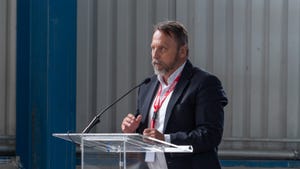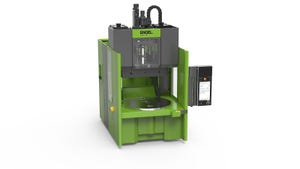Crew takes helm at Sabic IP
July 1, 2008
|
This May, the torch that once belonged to the iconic Jack Welch was passed to plastics industry veteran Charles Crew, who became the president and CEO of Sabic Innovative Plastics (Pittsfield, MA; www.sabic-ip.com). Sabic IP was created in September 2007 when Sabic (Saudi Basic Industries Corp.) acquired GE Plastics, which was headed by Welch during the early '70s before he became General Electric's chairman and CEO.
Crew, who has been with GE Plastics and now Sabic IP for more than 30 years, held a variety of positions that have prepared him for his new role. In a recent phone interview, he told IMM that his last 18 months have been spent heading up the global ventures business, which licenses technology and acquires and divests companies, and also helping in the selling of GE Plastics. His other responsibilities have included running the ABS business (Cycolac, Cycolloy), acting as the first president and CEO of LNP (Exton, PA) after it was acquired, as well as heading up operations in Europe and commercial business in the Americas.
“I've also learned the customer side of this business, which is critical,” Crew says. “Development activities are important in maintaining credibility with OEMs and relationships with processors. My focus then and now is on how to help our customers grow. Sabic is also a customer-centric business rooted in relationships, so this is a great fit.”
While other major resin producers have publicly announced product price increases brought on by rising feedstock and energy costs, Sabic IP has remained relatively quiet. Says Crew, “Our customers understand the cycle we're in, and we are passing costs on, but we don't feel the need to publicly announce them.”
In addition, application development specialists are working to help customers take cost out via productivity improvements, shorter cycle times, tool design, and thinner walls. “Metals and aluminum pricing has increased more on a percentage basis than engineering thermoplastics,” Crew adds. “We're positioned to provide customers with alternatives, and we also offer the design help needed to make the switch.”
Sabic IP is buying feedstocks at market prices, according to Crew, and has no advantaged position in feedstocks from its petroleum-producing parent in Saudi Arabia. “The only feedstock we buy from Sabic is benzene,” he adds, “and at market prices.”
In addition to focusing on customer growth, Crew confirms that the company will expand the high-performance part of its portfolio, adding to the Extreme resin line. “Four or five years ago, we set a plan to invest in specialties, and we are now making sure we have the assets in place,” he says. Sabic IP is building a new PEI (Ultem) plant in Spain, due to be operational by Q1, which will also produce thermoplastic polyimide (Extem) that boasts continuous temperature up to 230°C.
Emerging markets are another of Crew's focal points. “We've been in China with physical assets for 20 years, and have just expanded the Nansha plant with more capacity for Noryl, Cycoloy, LNP products, and sheet and film. It's a terrific market, with high double-digit growth, and we are investing in it.”
Sabic IP is also expanding its compounding assets in other parts of Asia. Crew acknowledged that the company is working with India to fulfill emerging market needs. In Korea, a Verton long-glass-fiber line was recently installed to meet the requirements of electronics and automotive industries, another example of investment in local capacity.
In the Middle East, Sabic IP will open a polycarbonate plant in Saudi Arabia that will be owned by a joint venture called Kayan and is expected to begin operating in 2010. “An ABS plant will follow in 2011, based on our Cycolac technology, and will be wholly owned by Sabic,” Crew adds. “Investment in emerging markets is key. We will continue to work on opportunities in specific industries.
Automotive in China is expanding, for instance, so we have to be there to support those OEMs and tiers. Electronics and medical industries are also globalizing.”
It is no coincidence that the three fastest-growing end-use markets for Sabic IP are electronics, automotive, and high-tech, which includes medical, defense, and aerospace.
“Electronics includes business equipment, telecom, and cellular phones,” he says, “and we still see great growth on a global basis. In automotive, there is a huge growth opportunity in polycarbonate glazing and lightweighting. And for high-tech markets, we can provide the high performance needed.”
About the Author(s)
You May Also Like



